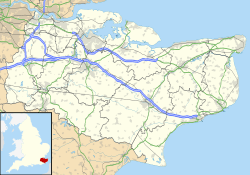RAF Throwley facts for kids
Quick facts for kids RAF Throwley |
|||||||
|---|---|---|---|---|---|---|---|
| Near Throwley, Kent in England | |||||||
|
Shown within Kent
|
|||||||
| Coordinates | 51°14′52″N 000°51′07″E / 51.24778°N 0.85194°E | ||||||
| Type | Royal Air Force base | ||||||
| Site information | |||||||
| Owner | Air Ministry | ||||||
| Operator | Royal Air Force Royal Flying Corps |
||||||
| Site history | |||||||
| Built | 1917 | ||||||
| In use | 1917-1919 | ||||||
| Battles/wars | First World War | ||||||
| Airfield information | |||||||
| Elevation | 112 metres (367 ft) AMSL | ||||||
|
|||||||
Royal Air Force Throwley, or RAF Throwley, was a military air base in England. It was used by the Royal Air Force (RAF). The base was located about 1.2 miles (1.9 km) south of Throwley, Kent. It was also about 7 miles (11 km) north of Ashford, Kent.
Before the RAF took it over in April 1918, it was known as Throwley Aerodrome. The Royal Flying Corps, which was the air force before the RAF, also used this site.
Contents
History of RAF Throwley
RAF Throwley played a part in the First World War. It was an important place for defending England's skies.
Early Days as a Landing Ground
In 1916, the Royal Flying Corps needed a place for planes to land. They bought land near Bells Forstal and Throwley Forstal. This area included Dodds Willows and the Bells Forstal farmhouse.
This new landing ground was used by squadrons. These squadrons helped protect London, the Thames Estuary, and the county of Kent from enemy attacks.
Squadrons and Aircraft at Throwley
From October 1916, a part of 50 Squadron RFC started using Throwley. They sent some of their aircraft there from their main base.
In July 1917, a new group called 112 Squadron arrived. They flew different types of biplane fighter aircraft. These included the famous Sopwith Pup, Sopwith Camel, and Sopwith Snipe. These planes were important for air battles during the war.
In February 1918, 143 Squadron was formed at Throwley. They flew the Armstrong Whitworth F.K.8, which was a two-seater plane. However, this squadron soon moved to a nearby base called RAF Detling.
Training and Disbandment
On December 20, 1917, 188 Squadron was created at Throwley. This squadron was a training unit. They used the Avro 504K aircraft to teach new pilots.
By June 1918, 188 Squadron was training pilots to fly the Sopwith Camel. This was a very well-known fighter plane.
After the war ended, the need for these bases decreased. In March 1919, 188 Squadron RAF was disbanded. Then, in June 1919, 112 Squadron RAF was also disbanded. The land that made up RAF Throwley was then given back to farmers. It became farmland again.
Aircraft and Units Based at Throwley
Here are some of the squadrons and aircraft that were based at RAF Throwley:
- No. 50 Squadron RFC (1916–1918): This squadron sent parts of its unit from Detling Aerodrome.
- No. 112 Squadron RFC/RAF (1918–1919): They flew the Sopwith Pup, Sopwith Camel, and Sopwith Snipe.
- No. 142 Squadron RFC (1918): They used the Armstrong Whitworth F.K.8.
 | Leon Lynch |
 | Milton P. Webster |
 | Ferdinand Smith |



